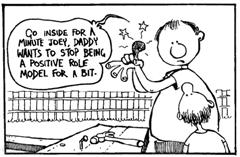Parenting: Role Models
Ron Thow is the father of 11 year old Ben. He has a research interest in family and developmental psychology.
Parents are the first and, hopefully, best role models for their children. This, of course, means that we can’t always get away with just telling our children what to do—especially if we are doing something different.
Younger children especially tend to see the world in black and white, right and wrong. It isn’t until they are much older that they begin to realise that there are shades of grey in the middle as well.
So, if we as parents are to help our children to become the best versions of themselves that they can be we have to walk the walk as well as talk the talk. The foods we eat, the exercise we get or how we interact with others—showing appropriate manners and respect—all of these things are important and our children’s behaviour will generally reflect on our own.
But before you decide that you have been sentenced to a life of perfect behaviour so that your children will be good adults, parents are not the only role models that children take heed of.
Children will find a range of role models in a wide variety of places, from the fictional on television and in books, to sporting icons, teachers, friends and other family members.
One of the most important skills that you can help your children to develop is that of evaluating potential role models.
Collectively these people are known as ‘heroic’ role models. They are people that others look up to, aspire to be like and want to copy. In NZ this especially means sports stars and celebrities.
The heroic role model is a very powerful icon and this can be a huge benefit when they model pro-social behaviours, but an equally big problem if the modelin question is involved in negative or anti-social behaviour.
These role models are the mainstay of the advertising industry—after all, if Sarah Ullmer eats McDonalds then it can’t be ‘junk’, can it? Which means that the perception of them can be distorted in various ways.
This distortion can result in unrealistic expectations for the child who wants to emulate them. The cool loner hero who breaks the rules and gets the mission accomplished is fine as a fictional movie character, but generally wouldn’t last long in the real world.
So, teaching your children to make judgments about their heroes is very important. All sorts of things stem from that skill.
The ability to learn from others’ mistakes or copy others’ successes, creating self-respect and respect for others, and identifying societal expectations and norms, to name a few. So how do we foster critical thinking about potential role models?
Expose your children to a variety of role models. Don’t just rely on television or sports. In this way they begin to learn that different people have different things to offer, different skills or perspectives and that it is okay that one approach to problem-solving doesn’t fix every situation.
Talk to them about people that they see in daily life, their teachers, friends or family for instance, and ask questions. Asking them if they think that the actions or behaviour of someone else was appropriate, right or wrong in a given situation will start to build the foundation for critical thinking and decision-making about your child’s own behaviour.
Point out when you have made an error. If you demonstrate that errors are just part of being human and that how you deal with them is important you foster the child’s taking personal responsibility for their mistakes. This is an important part of developing confidence, assertive behaviour, and a healthy self-image.
Encourage children to reach for role models that will stretch them in life. Getting your children to strive for their own goals is much more positive than simply pushing them.
They are more likely to achieve more of their potential if they are in the driver’s seat and you are the co-pilot than if the positions are reversed.
But whatever other role models your child finds, try to be the best one that you can be.












